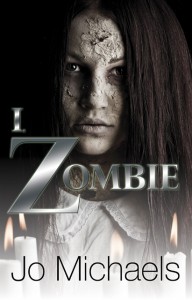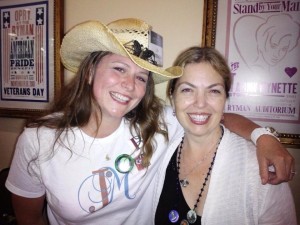Fear Factors
Today we have the privilege of a guest post by the lovely Jo Michaels. While on a covert mission for the Zombie Survival Crew in Nashville, I ran into Jo in the hallway of the Millennium Maxwell House Hotel and learned she was knowledgeable about zombies, so after checking to make sure we were not being spied upon by the UGA, we had a confidential chat on zombie behavior. I knew then she’d be a perfect person to share some of her knowledge with the Zombie Survival Crew faithful.
Fear Factors
What’s Really Going on in those Zombie Novels
by Jo Michaels, author of I, Zombie
So, I’m sure you’ve all picked up a zombie novel and turned to page one with your breath in your throat and your hands shaking as you contemplated what horrific situations you were about to be treated to, right?
Is it because you’re anticipating the sticky situations people will undoubtedly get themselves into and out of? Or, is it the mindless munching of brain matter by half rotted, animated corpses that gets your pulse racing?
Chances are, it’s a mixture of both. Zombie novels aren’t about the eating of flesh. While that’s a key component in the movement of the plot and something adding to the spine-tingling horror of it all, it’s not what’s lurking behind the scenes.
Deep within the pages of your everyday zombie novel there’s a central theme: survival of humanity and basic compassion. What you’re reading about is the battle—both with the creatures, who used to be thinking, feeling humans, and with the character’s own sense of what’s right and wrong while trying to survive. All around the character there are old friends, family members, and people those characters met along the way that now must be destroyed.
How do you pull the trigger when you’ve had a conversation with the person staring back at you with those milky zombie eyes? What if it’s your child?
Many times, authors of zombie novels go the extra mile to include how a parent tried to keep their feral child safe once it turned; because the parent(s) were unable to do the unthinkable. A neighbor might present a challenge (it depends if they were easy to work with over that property line dispute), but if they mean to harm or eat you, chances are you wouldn’t have much of a problem pulling the trigger, using a machete, or sticking them in the head with a pitchfork (hey, I lived on a farm; don’t judge me).
Survival of a zombie apocalypse is all about preparation for the masses. You’re stocked with weapons, food (like Twinkies), and those nifty little tablets to sterilize water. But are you mentally prepared to deal with the inner turmoil of being forced to kill someone you know and/or love if they turn into a moaning people eater? Is there any way to prepare for that?
 A good zombie novel won’t just focus on the terror, flesh eating, or monsters. No, it’ll make you think about survival of your physical and mental self. If you had to slice up someone you knew, would your mind be okay?
A good zombie novel won’t just focus on the terror, flesh eating, or monsters. No, it’ll make you think about survival of your physical and mental self. If you had to slice up someone you knew, would your mind be okay?
I imagine you’re thinking: If it were in defense of my family or loved ones, I’d have no problem taking someone out that was threatening us; and I wouldn’t feel badly about it afterward. I agree. There’s the crux of the issue. Where is the line drawn? What happens when the person has just been bitten and still looks/acts/thinks like the uninfected? Is it still an easy decision?
These are all situations in the arsenal of the zombie novelist used to make you squirm in your seat and wonder what the character will do. Without the niggling doubt in the back of your mind, you probably wouldn’t enjoy the book. What will the character do if Bob is turned? And, you flip the page to find out.
Unlike vampire novels, werewolf novels, or other horrible creature novels, zombies bring an element that can’t be touched by anything else: humanity. We know there’s no cure for any of these other afflictions; but what if there is for the disease causing the zombies to re-animate? Doubt sometimes stays our hand.
So, the next time you lift a zombie novel and read the prose that was so carefully crafted to touch your human side, think about why you enjoy those tales so dang much. They delve very deeply into your belief system, try and connect with you on an emotional level, and show you what kind of struggles you may face during the bane of an apocalypse.
I took it one step further. My zombies are thinking, feeling humans—with a disease rotting away their motor functions, voices, and skin—that eat live animals. If you enjoy the human element of your zombie novels, and ever wondered what it might feel like to turn and be hunted, check out my novel: I, Zombie.
Thanks for the invitation to write something for your beautiful group, and I hope you all have a lovely (zombie free) day!
What’s your favorite thing about a zombie apocalypse novel?
Well, that’s all for today, folks! Until next time, WRITE ON!
~ Jo Michaels
 This is how I remember Jo best (pictured with Christina Mercer). She absolutely rocks the cowboy hat and has a smile that lights the entire place. Her contact information is at the bottom of this post, and I recommend you check out her work, and Tweet her or drop her a line on Facebook.
This is how I remember Jo best (pictured with Christina Mercer). She absolutely rocks the cowboy hat and has a smile that lights the entire place. Her contact information is at the bottom of this post, and I recommend you check out her work, and Tweet her or drop her a line on Facebook.
About I, Zombie:
It’s the end of the world as we know it.
Trixie Collins is a normal teen making her way through high school. One night at a party, a boy comes on to her and won’t take no for an answer. As she jerks her arm away, his fingernails cut into her skin.
When she finds her dog’s mutilated body and realizes she’s to blame, she starts to think maybe the zombie apocalypse they’ve been screaming about on the news isn’t a hoax after all. Worse, she begins to think maybe she’s one of the infected.
Now it’s a fight for life as she joins together with her brethren to stop the humans intent on destroying them. Are zombies all bad, or is it just a huge misunderstanding?
Where to find Jo around the web
Website | Twitter | Facebook | Amazon Author Page | INDIE Books Gone Wild

